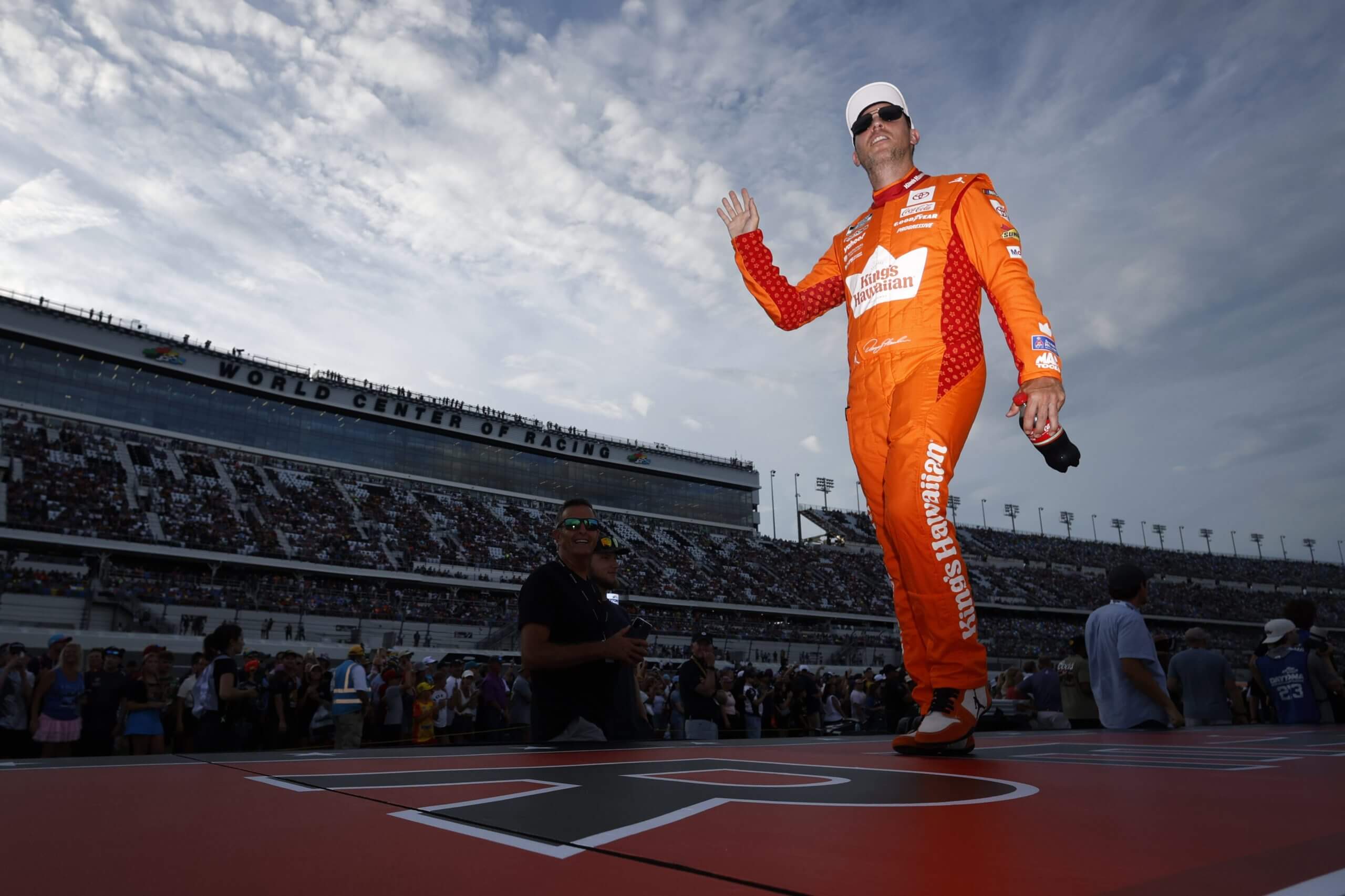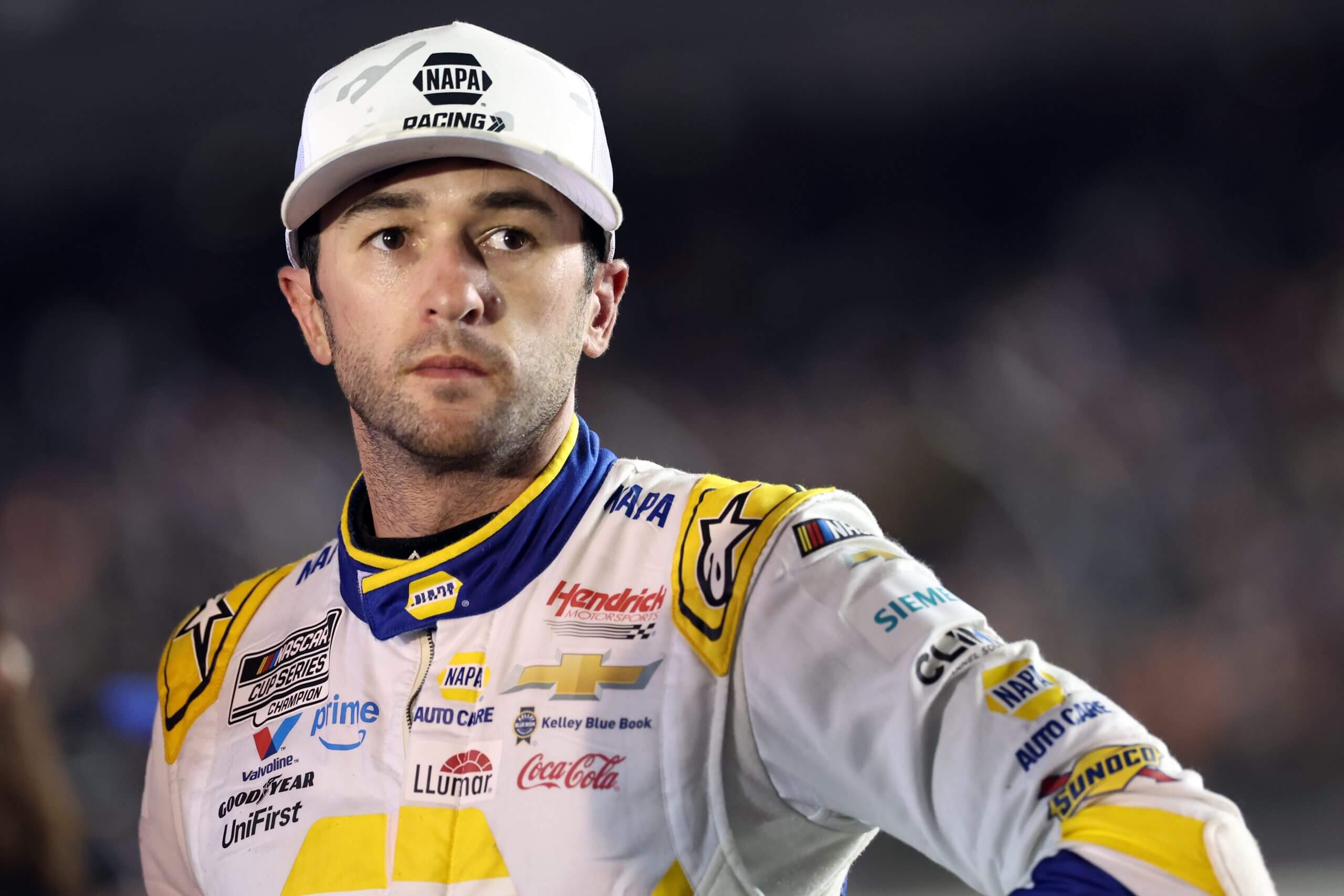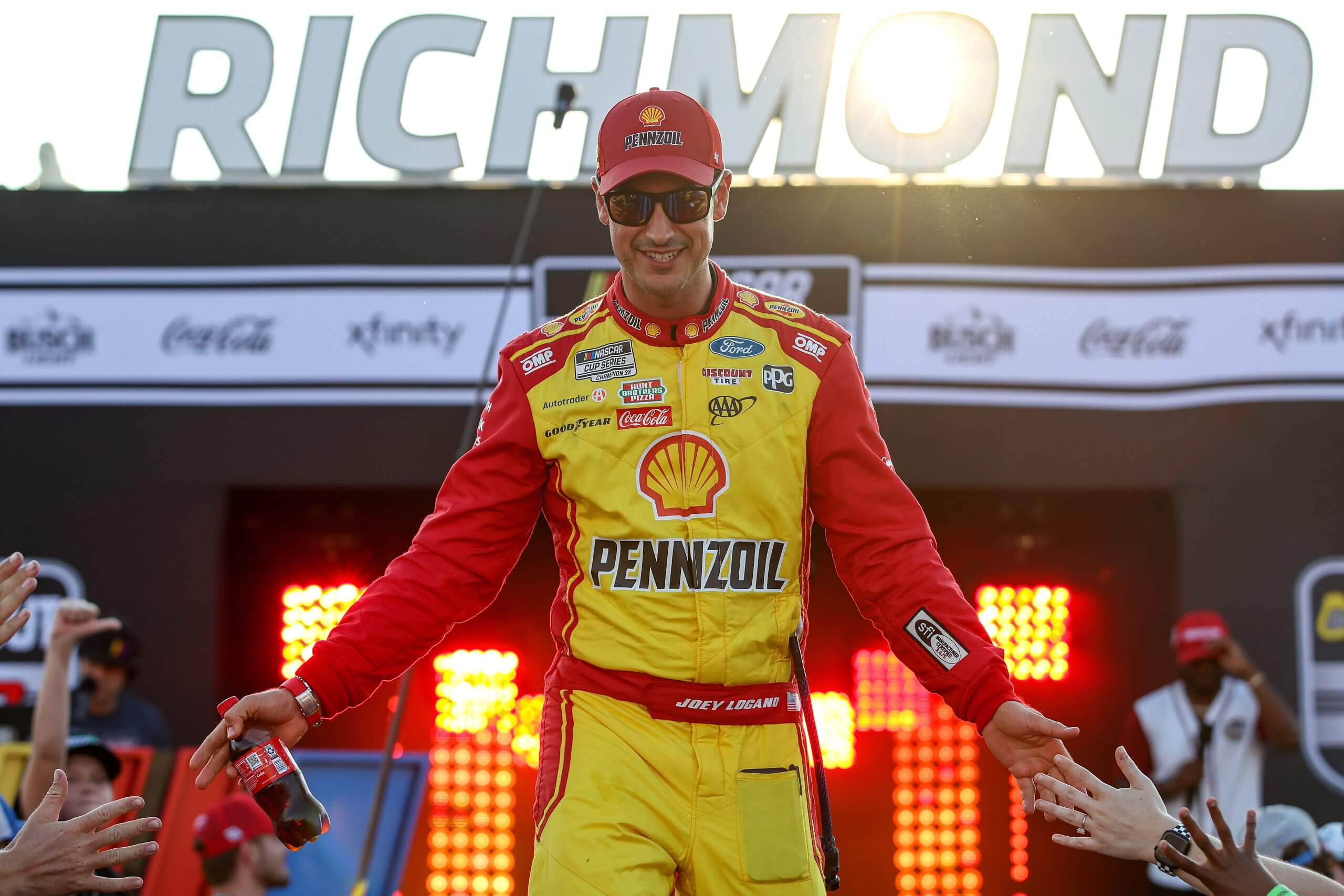It wasn’t easy, and far more dramatic than Alex Bowman would’ve preferred, but thanks to Ryan Blaney’s win in the NASCAR Cup Series regular-season finale Saturday at Daytona International Speedway, Bowman locked himself into the playoffs.
Bowman enters as the last seed in the 16‐driver playoff, certainly an uphill climb if the Hendrick Motorsports driver is to win the championship. But the history of NASCAR’s knockout playoff has shown that seeding isn’t always all that important — last year’s champion entered the playoffs as a No. 9 seed — with the path to the title more about executing well, avoiding disastrous finishes, and finding a way to win.
With this in mind, here are the strengths and weaknesses of all 16 drivers heading into Sunday’s playoff opener at Darlington Raceway.
Kyle Larson
Rank: 1
Playoff points: 32
Wins: Three (Homestead, Bristol, Kansas)
Best championship finish: First (2021 champion)
Why he can win: Even amid a season where Larson and the No. 5 Hendrick Motorsports team haven’t had their level of speed or consistency, he remains a viable threat to win the championship. He is more than capable of winning at any of the 10 playoff tracks, and his 32 playoff points are tied with William Byron for series best. No one would be surprised if Larson goes on a torrid streak that sees him win multiple times and roll to a second series title.
Why he won’t: The No. 5 team hasn’t been its typical dominating self, especially during a rough summer stretch in which Larson has led just 34 laps over the past 14 races. That is an eye-popping number, speaking to just how “off” he and the team have been. In a season where there is little separation among the title contenders, the hiccups that have slowed Larson may prove to be the difference between another deep playoff run and an early-round elimination.
William Byron
Rank: 2
Playoff points: 32
Wins: Two (Daytona 500, Iowa)
Best championship finish: Third (2023, 2024)
Why he can win: Byron has had arguably the best overall car of the season, as evidenced by his regular-season championship and series-leading total in laps led — this despite a midsummer lull in results that saw his No. 24 team collect only two top-15 finishes in eight races. He should be considered one of the favorites to make it to the Championship 4, and then anything can happen in the title race.
Why he won’t: Hendrick cars just have not been fast enough at Phoenix, which is ultimately all that matters in this format. Even though Byron has been Hendrick’s best car there in the Next Gen Era (five top-10s in seven starts, including a win), the track hasn’t suited the team’s strengths despite a company-wide effort to improve. It seems like Phoenix could be a Team Penske or Joe Gibbs Racing victory, which means Byron’s road to the title has a considerable roadblock.
Denny Hamlin
Rank: 3
Playoff points: 29
Wins: Four (Martinsville, Darlington, Michigan, Dover)
Best championship finish: Second (2010)
Why he can win: Hamlin enters the playoffs tied for the series lead in victories, but that’s a bit of an undersell; the other driver, Shane van Gisbergen, won all four of his races on road courses. In reality, Hamlin should be considered one of the most dangerous drivers in this year’s playoffs. His No. 11 team has shown speed on virtually every type of track and, unlike last season, Hamlin has a nice cushion of playoff points to use. Perhaps the “best driver to never win a championship” can finally shed that moniker the month he turns 45 years old — and with a new crew chief, to boot.
Why he won’t: We’re talking about Denny Hamlin here. Something unlucky or unfortunate always happens to this guy in the playoffs, so why should this year be any different? Hamlin has been one of the most outspoken drivers when it comes to criticizing the playoff format, and he’s intimately familiar with its pitfalls. After all, we’ve seen this story before: Hamlin enters the playoffs as a favorite to make the Championship 4 and perhaps win it, then doesn’t — again — for whatever reason. Rinse and repeat.

This could be Denny Hamlin’s year. Or … (Sean Gardner / Getty Images)Ryan Blaney
Rank: 4
Playoff points: 26
Wins: Two (Nashville, Daytona summer)
Best championship finish: First (2023)
Why he can win: The same description probably applies here to all three Team Penske drivers, but the team is simply one of the most formidable we’ve seen on shorter, flatter tracks. And guess what? This year, the playoffs are filled with them. Not only are Martinsville and Phoenix the two final races — which Penske has already used to win three straight championships, including one for Blaney — but this year they are joined by Gateway (a Penske win last season) and its cousin New Hampshire. Plus, Blaney has been the best of the organization’s cars all season and should have a handful of wins by now. He could easily win a second title in three years and make it four straight for Penske.
Why he won’t: His teammates. Joey Logano has clearly mastered this format and will be tough to beat again; if both drivers are in the Championship 4, we could see a similar situation to last year, when Logano out-dueled Blaney straight up in a head-to-head, 1-2 finish. Other than that, though, this playoff schedule lines up extremely well for Blaney to make a third straight Championship 4 appearance.
Christopher Bell
Rank: 5
Playoff points: 23
Wins: Three (Atlanta, COTA, Phoenix)
Best championship finish: Third (2022)
Why he can win: Bell can win on any style track, any given week. He’s an elite talent paired with an equally elite crew chief in Adam Stevens, who is one of only two active crew chiefs with multiple titles on his resume. In winning three consecutive races in the spring, Bell showed what happens when he and his team are in full stride. And with two additional low-banked, small ovals (Gateway and New Hampshire) slotted into the playoffs this year, it only enhances Bell’s title candidacy as he frequently shines on these types of tracks. It’s almost expected that he racks up a win or two in the early rounds, giving him additional bonus points to further help his cause in the semifinal round.
Why he won’t: As great as Bell may be, he can also be mistake-prone at times, often resulting in him seeing potential wins slip away. Such missteps can prove quite costly in an unforgiving playoff format where winning ensures advancement to the next round. And while those three consecutive wins in spring were impressive, he hasn’t won a points race since (he won the non-points All-Star Race in May) and has led double-digit laps in just two of the past 20 races.
Shane van Gisbergen
Rank: 6
Playoff points: 22
Wins: Four (Mexico City, Chicago, Sonoma, Watkins Glen)
Best championship finish: N/A (first appearance)
Why he can win: It would take the following sequence of events to occur: Van Gisbergen makes it through Round 1 on points, wins at the Roval in Round 2, wins at Talladega in Round 3 to make the Championship 4 and is running at the finish as the other three title contenders crash or have mechanical failures. If that sounds harsh, apologies — we’re just being realistic.
Why he won’t: Van Gisbergen has exceeded all expectations in his rookie season, but he’s still a work in progress when it comes to oval racing. There’s nothing wrong with that — it was the plan all along, and no one would even think he should be regularly finishing in the top 10 yet. The fact that he can go to Richmond and have a nice, solid night in the top 15 is actually super impressive. But we’re talking about a championship here, and that’s a far different story.
Chase Elliott
Rank: 7
Playoff points: 13
Wins: One (Atlanta)
Best championship finish: First (2020 champion)
Why he can win: Even in a playoff format that emphasizes winning, being able to finish up front on a near weekly basis still matters. And during the regular season, no one had better consistency than Elliott, whose 12.0 average finish led the series. If he can carry over this consistency to the playoffs, it should be enough to carry him to another Championship 4 berth — which would be his fourth in six years.
Why he won’t: Consistency is great, but can Elliott rise up and win should he need to? Considering he’s won just twice in the past 96 races, there is reason to doubt it. He also hasn’t shown the ability this season to be dominant, something several other contenders have exhibited at times. Maybe this playoff unfolds like 2020, when Elliott came in a bit under the radar, then got hot at the right time. More than likely, though, his lack of bonus points bites him, and he fails to make the title round for a second consecutive year.

Chase Elliott has been consistent, but can he get a win when it matters most? (James Gilbert / Getty Images)Chase Briscoe
Rank: 8
Playoff points: 10
Wins: One (Pocono)
Best championship finish: Ninth (2022)
Why he can win: Briscoe enters the playoffs as arguably the hottest driver in the series. After a slower-than-expected first half, in which Briscoe struggled to adapt to his newfound fast cars at Joe Gibbs Racing and Martin Truex Jr.’s old team, Briscoe has looked like a legitimate title contender. In the six races heading into the regular-season finale, Briscoe led the Cup Series in average finish (more than three spots better than the next-closest driver) and had double the amount of top-five finishes (four) as anyone else. Briscoe has also been an exceptional qualifier this year — he leads the series in average start and has six poles, which is very important in an era where passing is difficult and track position is crucial.
Why he won’t: Though Briscoe is a clutch performer and has shown he can make a deep playoff run without many playoff points in his pocket — he advanced to the Round of 8 in 2022 as a No. 12 seed despite starting with only nine playoff points — the lack of points can really hurt a driver’s chances. And though he’s been fast lately, Briscoe still only has one victory — a fuel-mileage win at Pocono. The eventual champion will likely have to win multiple races en route to a title, and Briscoe enters the playoffs with only three career victories.
Bubba Wallace
Rank: 9
Playoff points: Eight
Wins: One (Indianapolis)
Best championship finish: 10th (2023)
Why he can win: Although the stats may not fully support this statement, a good case can be made that Wallace is in the midst of the best season of his career, on pace to set highs in several key statistical categories. Momentum is also on Wallace’s side as he enters the playoffs running the best he has all season. He’s finished in the top 10 in four of the past six races — and one of the races he didn’t (Richmond), he led a career-high number of laps and may have won had a tire not fallen off during a pit stop. The schedule also sets up favorably for Wallace, with several of his better tracks upcoming, giving him a real shot to make a deep postseason run.
Why he won’t: While the No. 23 23XI Racing team has the look of a team poised to be a bracket buster, there is the unmistakable reality that this team tends to make mistakes at key moments. Witness Richmond two weeks ago, where Wallace was well-positioned to get the W before the issue on pit road. How will this team respond in a cut-off race facing elimination?
Austin Cindric
Rank: 10
Playoff points: 8
Wins: One (Talladega)
Best championship finish: 11th (2025)
Why he can win: The playoff schedule could not be better for Cindric. Not only is he capable of victories at places like Gateway (he is the defending winner, after all), Cindric has made his name as perhaps the best current superspeedway racer in the series. Talladega, where he won in the spring, is now in Round 3 — which decides the Championship 4 drivers. He also finished fourth at the Charlotte Roval last season. So there are hints of a surprise playoff run. By the way, Cindric has won an Xfinity Series championship at Phoenix before (and finished second in another after getting bumped out of the way on the final lap).
Why he won’t: Until Richmond last week, Cindric went 14 straight races without a finish in the single digits. He would not have made the playoffs aside from his superspeedway win. He has fewer top-10 finishes than John Hunter Nemechek (26th in the standings) and only one top-five all season other than his Talladega win. Those aren’t very inspiring statistics.
Ross Chastain
Rank: 11
Playoff points: 7
Wins: One (Charlotte)
Best championship finish: Second (2022)
Why he can win: An absolute grinder behind the wheel, Chastain maximizes whatever speed his equipment possesses every single week. This ability often lends to better finishes than he should otherwise have, and it’s why he ranks second in defense and fifth in restarts — two areas where preparation and skill can overcome a car that may not be the best. In a playoff format where every point matters, Chastain’s approach should pay dividends.
Why he won’t: Being an analytics darling is great, but there is no denying the lack of speed too often shown by Chastain’s team. This casts doubt on whether he can advance past the early rounds, especially in a format where winning carries such importance. Another hurdle: Chastain has the second-lowest starting position among the 16 playoff drivers, ahead of only rookie (and Trackhouse teammate) Shane van Gisbergen. With passing often challenging and track position paramount, starting toward the back so frequently makes it hard to earn stage points and climb to a decent finish.

Guess who’s back. (Samuel Corum / Getty Images)Joey Logano
Rank: 12
Playoff points: 7
Wins: One (Texas)
Best championship finish: First (2018, 2022, 2024)
Why he can win: If you’re really asking that question, you haven’t met Logano and crew chief Paul Wolfe. They are the mad scientists of this format, coming up with the wildest of ways to win titles and stack up Championship 4 appearances (he has six of them!) even when it looks like they don’t have the speed to do it. As mentioned in the Blaney item above, the schedule stacks up perfectly for Logano and his team to make yet another run despite having just one win and three top-five finishes this season along with the 13th-best average finish. But hey, Logano won the title last year with the worst average finish of any champion in history. Dismissing Logano’s chances of doing it again would be a huge mistake.
Why he won’t: The odds have to catch up with Logano at some point, right? His speed hasn’t been great; Logano had just seven top-10 finishes, which is on pace to be his lowest total since 2011. Three drivers who missed the playoffs have more top-five finishes than Logano this season. That’s not the traditional recipe for a championship run. Unless …
Josh Berry
Rank: 13
Playoff points: 6
Wins: One (Las Vegas)
Best championship finish: 27th (2024)
Why he can win: Berry’s Wood Brothers Racing team is its own entity, but essentially, it is a fourth Team Penske car. Being tightly aligned with Penske is not a bad thing in the playoffs, considering Penske drivers have won the past three championships. It also helps that Berry is proficient on short ovals (a mile or less), of which there are five in the playoffs, and has won on an intermediate track this season, of which there are two in the playoffs. If he can advance past the first two rounds, Berry could shock people in the semifinal bracket.
Why he won’t: Since Berry won at Las Vegas, he’s posted just three top-10 finishes, none of which were inside the top five. Nor has he led a lap in the past 14 races. He also has only six playoff points. None of this indicates Berry is poised for a deep playoff run.
Tyler Reddick
Rank: 14
Playoff points: 6
Wins: None
Best championship finish: Fourth (2024)
Why he can win: Reddick proved last season he’s capable of making a deep playoff run, and his heroic effort to claim victory at Homestead launched him into the Championship 4. The team would have to get hot at the right time, but Reddick is one of the most talented drivers in the Cup Series — and crazier things have happened (see: last year with Logano).
Why he won’t: This simply hasn’t been the same No. 45 team we saw last year. In general, 23XI Racing has not been as strong — and Reddick hasn’t had the sort of finishes that make anyone think he’s a championship threat. He even had to sweat out his playoff berth heading to Daytona, which is odd for a driver who made a final four run last season and who was expected to win three or four races this year. Reddick led only 153 laps in the regular season, which ranked 15th.
Austin Dillon
Rank: 15
Playoff points: Five
Wins: One (Richmond)
Best championship finish: 11th (2017, 2020, 2022)
Why he can win: As Dillon showed by winning at Richmond — and other times throughout his career — he’s fully capable of pulling off an out-of-nowhere victory. Richmond does share similarities with Gateway, the middle race in Round 1, so a good finish there could help him advance. He and Richard Childress Racing are also a team that relishes proving its detractors wrong, and with not many expecting Dillon to stick around long, the opportunity is there to again show why he shouldn’t be counted out.
Why he won’t: As well as Dillon has performed lately, the No. 3 team has not consistently finished well throughout the season. Dillon’s only top five was his Richmond win, and he finished the regular season ranked 26th in points. A lot would need to go right to think Dillon is going to vie for the title.
Alex Bowman
Rank: 16
Playoff points: Two
Wins: Zero
Best championship finish: Sixth (2020)
Why he can win: When Bowman is clicking, he’s fully capable of running up front, and winning, on a consistent basis. And the opportunity is there for him to do that in a playoff filled with some of his best tracks, particularly in the second and third rounds. Seven top 10s in the past 11 races point towards him being on the upswing at the most pivotal time of the year.
Why he won’t: Not only is Bowman one of only two championship-eligible drivers without a win, he also doesn’t lead many laps and hasn’t won a stage. Finishing in the top 10 is all well and good, but leading laps and routinely putting yourself in position to win are essential in the playoffs.
(Top illustration: Dan Goldfarb / The Athletic; photo: Chris Graythen / Getty Images)

